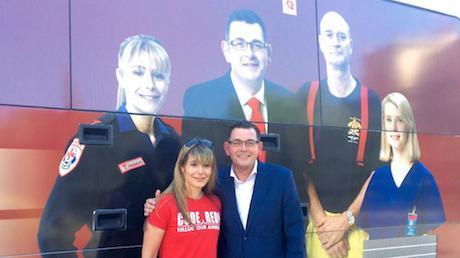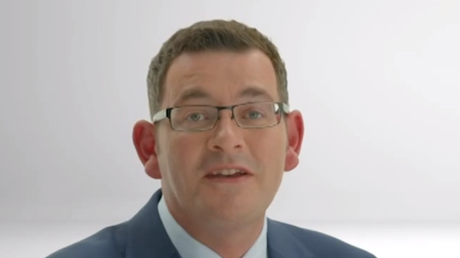‘At last. Just use what they said in the past. It is fatal for Labor. Lol, that was excellent’ (Brendan John Quinn, Twitter, 4/09/2014 8:18 am).
The latest Youtube offering from Liberal-National Party head office depicts a cartoon Bill Shorten as a weather-vane, blowing in the wind, this way and that. The image is intercut with a montage of television footage, damning newspaper headlines and ominous music.
The ad implies the federal Labor leader is weak and indecisive. It also shows why so many politicians are now fearful to the point of woodenness in front of the camera. Make a mistake, and you hand the opposition its next campaign on a plate. Cheap to make and easy to execute, the ad is fairly effective, though at least 90 seconds too long. At the hundredth (well, it seemed like it) “NO IDEA” thundering across the screen, only the most partisan viewer (Brendan, perhaps?) would still be ‘lol’ing along.
The adversaries in the forthcoming Victorian state election have been using similar techniques. Back in February, the LNP attacked Labor for taking donations from the Construction, Forestry, Mining and Energy Union (CFMEU), and the party’s leader, Daniel (now the chummier Dan) Andrews, for allowing the union to “control Victorian Labor”. Dissonant music cut with stills of evil unionists hammered out the message that Andrews was guilty of poor leadership and bad management, and would be “BAD FOR VICTORIA”.
The ALP responded with a similar low-cost montage ad that played on voters’ fears. Newspaper headlines backed by soaring music highlighted cuts to TAFE and the mess caused by the Member for Frankston, Geoff Shaw, who holds the balance of power in the Parliament after leaving the Liberal Party over a rorting scandal. The message was that government was in crisis, and the tag line was “Victoria deserves better than Denis Napthine”. The LNP parried with a virtually identical ad. Taking a ‘Look back at Labor’, it accused the ALP of presiding over “a decade of decay”: “Victoria can’t afford Labor,” it warned swinging voters.
As we get closer to the election, we can expect to see a lot more of this style of advertising. Before the parties embark in earnest on the battle of the attack ads, we should all stop, take a deep breath and ask ourselves a question: What kind of political culture do we want in Australia?
Do we want a political culture where people we don’t agree with are ridiculed and humiliated? Or do we want to live in an atmosphere of informed and respectful contestation?
As we enter the election campaign, these issues should be at the forefront of the mind of anyone concerned about Australian democracy. According to the polls, that’s just about everyone. In this year’s Roy Morgan Image of Professions Poll, State politicians came 25th out of 30 professions, Federal politicians 26th, beating only union leaders, real estate agents, advertising people and car salesmen. Too much is at stake for us to put up with the kinds of demeaning ads we’ve seen in recent years. Some have been about as grown up as a 'Daily Telegraph' front page. The more puerile of them have included Kevin Rudd as a lemon and the former Labor frontbench as squawking chooks in a henhouse.
In a recent discussion on the ABC, Dee Madigan, a veteran of five election campaigns, explained that political parties use negative or attack advertising because it works. That’s important, Madigan says, because there’s only one objective in an election campaign: to win.
Of course this is true. As Keating once said, “You change the government, you change the country.” Why would you join a political party if you weren’t prepared to do just about anything to ensure that it was you, not your rivals, who got to impose those changes?
But from the perspective of the less rusted-on, Madigan’s comment demonstrates everything that is wrong with our political culture and helps to explain why voters are increasingly disengaged from politicians and politics.
What’s the point of winning if, to do so, you have put your energies and resources into denigrating your opponent rather than developing visionary policies and explaining them to voters?
What’s the point of winning if, by humiliating your opponent, you have further demeaned the political culture, and rendered yourselves and the rest of the political class less trusted and more loathed than ever before?
You might have won office but, as the marketing scholars Janine Dermody and Stuart Hanmer-Lloyd have shown for the British context, you’ve also made things harder for yourself and your colleagues, now and into the future.
You’ve dragged the political conversation down another notch. Your next campaign will have to be even more childish and demeaning to compete for attention. As the tone slips, voters become further disengaged. You will be judged more harshly again. And so it goes on.
In a recent advertisement, Andrews and Victorian Labor seem to have cottoned on to the dangers of this race to the bottom. The ad addressed the LNP attempts to ridicule Andrews and blacken his name by linking him to the CFMEU, then ends on the positive.
It showed Andrews walking with his young daughter. Sometimes people say nasty things about you, he tells her, but you must still stand up for the things you believe in. The ad then shored up Labor’s electoral strengths – health and education – and ended with the campaign slogan “Putting People First”.
By addressing the LNP’s attacks, the ad takes a similar approach to that pursued by Ed Miliband, the British Labour Party leader, who recently took the sting out of the childish but persistent commentary that he resembles the cartoon character Wallace, of Wallace and Grommit fame, by admitting that he did … and so what?
The LNP have also run positive ads. One pushed the party’s historical strength on law and order. Another featured Denis Napthine extending his pitch to include jobs growth and opportunity, public transport, schools and health. The LNP were ‘Building a Better Victoria’.
Less motherhood and more detail might be preferable in these positive ads but at least they are respectful and professional. They present politicians who seem mindful of their role as paid representatives, as responsible grownups, not brawling school-kids. They take the issues and the voters seriously.
The parties’ ‘win at any cost’ mentality means we all lose eventually. It’s the politicians’ responsibility to develop convincing policies and communicate them clearly. It’s the voters’ responsibility to demand more policy debate and fewer personal attacks. It’s for all of us to demand more substance from our election advertising. Without it, our political culture will continue to decline.
Dr Jackie Dickenson is a researcher based in the School of Historical and Philosophical Studies at the University of Melbourne. She is the author of Trust Me: Australians and their politicians (Sydney: NewSouth, 2013) and numerous articles on political history and advertising. She previously worked in the advertising industry as a copywriter and taught creative advertising at tertiary level.




